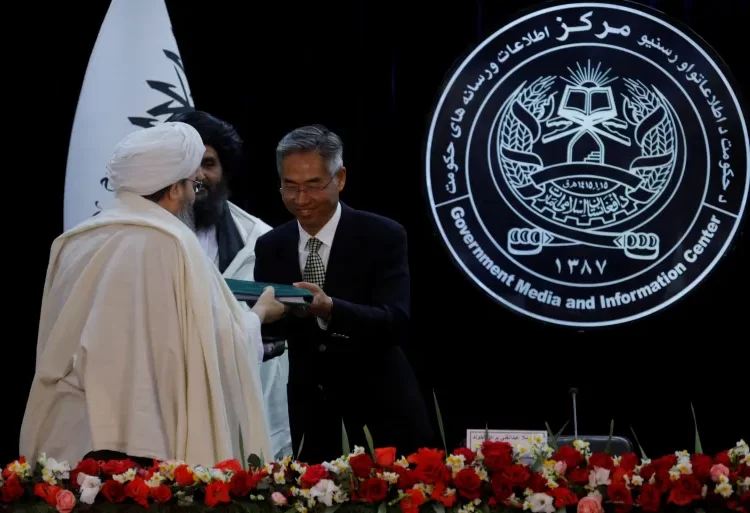China resorts to strategic chess game with Afghanistan’s oil and politics amid regional and global challenges.
By: Mehdi Rahbar
As expounded in the intricate game of chess – a finely concocted blend of power and politics – one ought to sacrifice a piece to ensnare an opponent. Reflecting on India, the cradle of this strategic pastime, chess is often played in quadruple, featuring a peculiar “red piece”. Unhinged to any particular player, the deployment of this “red piece” pivots on individual strategies and positions on the board.
Analogizing the Central Asian political arena to the chessboard, Afghanistan emerges as the exoteric “red piece”, manipulated according to the stratagems and capabilities of major and regional players amidst the complexities of international politics.
One must heed the simultaneous engagement of these political chess players in multiple games, amplifying the intricacy of the Afghan political context. With the US retreat from Afghanistan, China eyes at bringing the Taliban under its control by getting closer to the group. The resurgence of the Taliban power has been linked to regional instability, undermining Beijing’s grand vision and plans for the Belt and Road Initiative. Nonetheless, China’s influence on its western neighbor has fortified in the recent past.
Driven by the intent to diversify energy import sources, China has recently initiated a novel venture – a pact with the Taliban for daily oil extraction of 100,000 tons from Afghanistan. Despite labeled as a landlocked country given its rugged terrain and undiscovered energy resources, oil discoveries in its Amu Darya basin may exponentially intensify the “New Great Game” in Central Asia. And the game of the elders with this red piece will become more intricate than before.
Albeit the hitherto mentioned oil extraction may not suffice to meet China’s escalating demand, it’s crucial to underline that 80% of China’s oil imports are subjected to US control, passing through the Strait of Malacca, Singapore. However, if the Chinese find oil in Afghanistan and begin to produce it, they will transport this oil to China using a pipeline or train, and effectively bypass American oversight. Beijing’s prospective oil extraction and anticipated production from Afghanistan, unhindered by the US, avows an invigorating aspect of this political chess game.
This dynamic landscape raises an ancillary question – how does China envisage reimbursing the Taliban for the oil production? With the Taliban’s reign came comprehensive sanctions and stringent control on money transfers; even the UN resorts to cash transactions for humanitarian aid.
The potential for bartering goods with Afghanistan could circumvent this restriction, while satiating the fundamental requirements of the Taliban government – a strategic feat, Beijing is practically capable of.
The paramount issue confronting us transpires as the red chess piece in Central Asia “now” lies within Beijing’s grasp, but the subsequent move could see it fall into another participant’s hands. An esteemed Afghan scholar notably highlights the fact that, “one can temporarily employ an Afghan, but can never own and buy him permanently.”
Central Asia, visualized as a chessboard, beckons for other contenders to seize control, dictating the progress of the red piece in the foreseeable future. With the advent of Taliban power, a security threat to Chinese governance materializes, given China grapples with the quandary posed by a faction of its Uyghur minority domiciled in Kashgar, Xinjiang. At the heart of the matter lies the potential for extremism to take root and flourish in the less developed western territories of China, primarily amongst its Turkish-speaking Muslim populace.
Nonetheless, only the ever-revealing hands of time can unfold the nature of cooperation between a Taliban-controlled Afghanistan and China, particularly in the wake of mass oil production and the consequential dominion over oil revenues.
The views expressed in this article are those of the author and do not necessarily reflect the positions of Iran Nuances.






